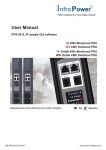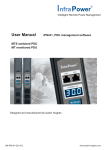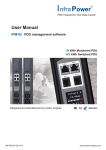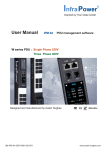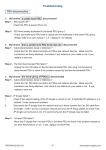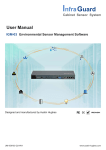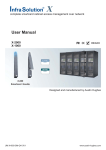Download InfraPower® | PPS-01 - User Manual
Transcript
Intelligent Remote Power Management User Manual PPS-01, IP dongle GUI software MTS switched PDU MT monitored PDU Designed and manufactured by Austin Hughes UM-PPS-01-Q212V9 www.austin-hughes.com Legal Information First English printing, October 2002 Information in this document has been carefully checked for accuracy; however, no guarantee is given to the correctness of the contents. The information in this document is subject to change without notice. We are not liable for any injury or loss that results from the use of this equipment. Safety Instructions Please read all of these instructions carefully before you use the device. Save this manual for future reference. ■ ■ ■ ■ ■ ■ ■ ■ ■ ■ ■ Unplug equipment before cleaning. Don’t use liquid or spray detergent; use a moist cloth. Keep equipment away from excessive humidity and heat. Preferably, keep it in an air-conditioned environment with temperatures not exceeding 40º Celsius (104º Fahrenheit). When installing, place the equipment on a sturdy, level surface to prevent it from accidentally falling and causing dam age to other equipment or injury to persons nearby. When the equipment is in an open position, do not cover, block or in any way obstruct the gap between it and the power supply. Proper air convection is necessary to keep it from overheating. Arrange the equipment’s power cord in such a way that others won’t trip or fall over it. If you are using a power cord that didn’t ship with the equipment, ensure that it is rated for the voltage and current labeled on the equipment’s electrical ratings label. The voltage rating on the cord should be higher than the one listed on the equipment’s ratings label. Observe all precautions and warnings attached to the equipment. If you don’t intend on using the equipment for a long time, disconnect it from the power outlet to prevent being dam aged by transient over-voltage. Keep all liquids away from the equipment to minimize the risk of accidental spillage. Liquid spilled on to the power supply or on other hardware may cause damage, fire or electrical shock. Only qualified service personnel should open the chassis. Opening it yourself could damage the equipment and invali date its warranty. If any part of the equipment becomes damaged or stops functioning, have it checked by qualified service personnel. What the warranty does not cover ■ ■ ■ Any product, on which the serial number has been defaced, modified or removed. Damage, deterioration or malfunction resulting from: Accident, misuse, neglect, fire, water, lightning, or other acts of nature, unauthorized product modification, or failure to follow instructions supplied with the product. Repair or attempted repair by anyone not authorized by us. Any damage of the product due to shipment. Removal or installation of the product. Causes external to the product, such as electric power fluctuation or failure. Use of supplies or parts not meeting our specifications. Normal wear and tear. Any other causes which does not relate to a product defect. Removal, installation, and set-up service charges. □ □ □ □ □ □ □ □ Regulatory Notices Federal Communications Commission (FCC) This equipment has been tested and found to comply with the limits for a Class B digital device, pursuant to Part 15 of the FCC rules. These limits are designed to provide reasonable protection against harmful interference in a residential installation. Any changes or modifications made to this equipment may void the user’s authority to operate this equipment. This equipment generates, uses, and can radiate radio frequency energy and, if not installed and used in accordance with the instructions, may cause harmful interference to radio communications. However, there is no guarantee that interference will not occur in a particular installation. If this equipment does cause harmful interference to radio or television reception, which can be determined by turning the equipment off and on, the user is encouraged to try to correct the interference by one or more of the following measures: ■ Re-position or relocate the receiving antenna. ■ Increase the separation between the equipment and receiver. ■ Connect the equipment into an outlet on a circuit different from that to which the receiver is connected. The company reserves the right to modify product specifications without prior notice and assumes no responsibility for any error which may appear in this publication. All brand names, logo and registered trademarks are properties of their respective owners. Copyright 2011 Austin Hughes Electronics Ltd. All rights reserved. UM-PPS-01-Q212V9 www.austin-hughes.com Unpacking The equipment comes with the standard parts shown on the package contents. Check and make sure they are included and in good condition. If anything is missing, or damage, contact the supplier immediately. Package contents ( 1 ) Vertical MTS / MT PDU x 1 - VMS mounting screw, set of 2 or 3 + - VMB mounting bracket set 2 - 3 sets M4 PEG M4 x 2 Bracket x 2 M6 M6 x 2 M6 nut x 2 M6 nut M4 OUT IN CUR REN 22 5 T (A ) ON DIP 1 2 3 4 5 RES 6 7 8 ET OUT IN CUR REN 22 5 T (A ) ON DIP 1 2 3 4 5 RES 6 7 8 ET M4 M6 nut M6 OR ( 2 ) Rackmount MTS / MT PDU x 1 Power ON ■ Connect the PDU into an appropriately rated receptacle ■ When the PDU is power on, the LED display will light up. That means all outlets are activated ■ Keep the equipments in the power off position until it is plugged into the PDU Don’t exceed the outlet, branch or phase limitations UM-PPS-01-Q212V9 www.austin-hughes.com Content < 1.1 > PDU meter setting & cascade P. 1 - 2 < 1.2 > IP dongle installation & connection P. 3 - 4 < 1.3 > IP dongle configuration P. 5 < 1.4 > PPS-01 IP dongle GUI Software P. 6 - 7 UM-PPS-01-Q212V9 www.austin-hughes.com < 1.1 > PDU meter setting & cascade LINK 1 OUT PDU cascade port DIP Switch <ON> DIP Switch <OFF> CURRENT (A) 2 Current display 3 Dip switch 225 ON 1 4 DIP 2 3 4 5 6 7 8 Reset button RESET ■ For rackmount PDU, 2 3 4 on the front panel left , 1 on the rear panel Cascaded PDUs setting Using the dip switch no. 1, 2, 3, 4 & 8 Cascaded PDUs 1st PDU 2nd PDU 3rd PDU 4th PDU 5th PDU 6th PDU 7th PDU 8th PDU 9th PDU 10th PDU 11th PDU 12th PDU 13th PDU 14th PDU 15th PDU 16th PDU UM-PPS-01-Q212V9 1 On Off On Off On Off On Off On Off On Off On Off On Off to setup each PDU level as below : Dip switch no. 2 3 4 On On On On On On Off On On Off On On On Off On On Off On Off Off On Off Off On On On Off On On Off Off On Off Off On Off On Off Off On Off Off Off Off Off Off Off Off P.1 8 Off Off Off Off Off Off Off Off Off Off Off Off Off Off Off Off www.austin-hughes.com 1st level PDU LINK 2nd level PDU CAT. 5 / 6 cable OUT LINK Up to 20 meters CURRENT (A) IP dongle ( refer to P.3 - 9 ) 1 2 3 4 5 6 7 ON 8 1 RESET ■ ■ ■ LINK Up to 20 meters 2 3 4 5 6 225 DIP ON 8 1 7 RESET DIP ON OUT CURRENT (A) 225 DIP ON CAT. 5 / 6 cable OUT CURRENT (A) 225 ON 3rd level PDU DIP 2 3 4 5 6 7 To LINK port of next PDU ( Up to 16 levels ) 8 RESET DIP ON DIP 1 2 3 4 5 6 7 8 1 2 3 4 5 6 7 8 1 2 3 4 5 6 7 8 Dip switch setting Dip switch setting Dip switch setting The PDU can be cascaded up to 16 levels For IP PDU access simply connect 1 x IP dongle - IPD-01 1 x IP dongle allows access to 16 levels Meter display setting Using the dip switch no. 5 & 7 to setup each PDU meter display as below : Current display Circuit A + Circuit B Circuit A only Circuit B only Dip switch no. 5 Off On On 7 Off Off On Audio alarm Using the dip switch no. 6 to setup each PDU audio alarm as below : Dip switch 6 Off On Enable Disable UM-PPS-01-Q212V9 P.2 www.austin-hughes.com < 1.2 > IP dongle installation & connection To remote PDU over IP, users can order IP dongle : IPD-01 IP dongle for vertical PDU Vertical IP dongle installation steps : - slide the IP dongle on the plate above the meter - plug the RJ-45 connector of IP dongle into the LINK port of the 1st level PDU meter - use the CAT. 5 / 6 cable to connect IP dongle to network device To LAN port Customer’s network device ( router or hub ) IP dongle ■ 1st level PDU LINK To LINK port of the 1st PDU OUT CURRENT (A) 225 ON 1 2 3 4 5 6 7 RESET UM-PPS-01-Q212V9 Please refer dip switch setting on P.1 - 2 for different level PDUs 2nd level PDU CAT. 5 / 6 cable Up to 20 meters LINK OUT CURRENT (A) 225 DIP ON 8 1 2 3 4 5 6 7 RESET P.3 3rd level PDU CAT. 5 / 6 cable Up to 20 meters LINK OUT CURRENT (A) 225 DIP ON 8 1 DIP 2 3 4 5 6 7 RESET 8 To LINK port of next PDU ( Up to 16 levels ) www.austin-hughes.com IPD-H01 IP dongle for rackmount PDU Horizontal IP dongle installation steps : - fix the IP dongle on the rear side of rackmount PDU with 4 screws - plug the RJ-45 connector of IP dongle into the LINK port of the 1st level PDU meter - use the CAT. 5 / 6 cable to connect IP dongle to network device To LINK port of the 1st PDU Rear side of rackmount PDU IP dongle To LAN port Customer’s network device ( router or hub ) UM-PPS-01-Q212V9 P.4 www.austin-hughes.com < 1.3 > IP dongle configuration After the completion of IP dongle connection, please take the following steps to configure the IP dongle : 1. Prepare a notebook computer to download the IP setup utilities from the link : www.austin-hughes.com/support/utilities/infrapower/IPdongleSetup.msi 2. Double click the IPDongleSetup.msi and follow the instruction to complete the installation. 3. Go to each first level PDU with the notebook computer & a piece of CAT. 5 / 6 cable to configure the IP dongle by IP setup utilities as below. Please take the procedure for all IP dongles ONE BY ONE. IP dongle on 1st level PDU CAT. 5 / 6 cable To notebook computer LAN port To IP dongle LAN port Reconnect the IP dongle with the network device ( router or hub ), after finish IP dongle configuration. Ensure the PDU in power ON status 4. Click Scan to search the connected IP dongles 5. Enter the device name ( min. 4 char. / max. 16 char. ) in the device name field. The default is Name. 6. Enter the location in the location field ( min. 4 char. / max. 16 char. ). The default is Rack_001. 7. Enter the password for security in the password field ( min. 8 char. / max. 16 char. ). The default is 00000000. 8. Re-enter the new password in the Confirm new password field. 9. Change the desired IP address / Subnet mask / Gateway, then click Save to confirm the setting to IP dongle. 10. The default IP address is as below: IP address : 192.168.0.1 Subnet mask : 255.255.255.0 Gateway : UM-PPS-01-Q212V9 192.168.0.254 P.5 www.austin-hughes.com < 1.4 > PPS-01 IP dongle GUI Software Each IP dongle provides a built-in GUI software, PPS-01, which allows user, via an I.E. web browser, to see PDU’s data and remotely manage the PDU over a TCP/IP Ethernet network. Each I.E. supports ONLY one IP dongle. If the user installs more IP dongles, multi windows will be required. PPS-01 is a management software but with very limited features. The user can use advanced software, InfraPower Manager IPM-01. Step 1. Open Internet Explorer ( I.E. ), version 6.0 or above Step 2. Enter the configured IP dongle address into the I.E. address bar ( Refer to set up IP utilities p.5 ) Step 3. Enter password ( Refer to set up IP utilities P.5 ) < Status > Status of all connected PDUs Aggregate current on each PDU Latest loading on each circuit of PDU Alarm threshold setup - Data refresh every 10 seconds - Disable Refresh during data input : save the changes : quit without changes UM-PPS-01-Q212V9 P.6 www.austin-hughes.com < Details > On / Off status of each outlet Remote on / off outlet ( MTS switched PDU only ) Rename outlet device, PDU and location Aggregate current on the PDU : save the changes - Data refresh every 10 seconds - Disable Refresh during data input : restart the PDU meter ( outlets are still activated ) : reload the PDU information < Setup > IP dongle configuration setting Password setting Network setting Hardware information provided : save the changes : reload the IP dongle to factory default ( Press Default > Apply ) : restart the IP dongle UM-PPS-01-Q212V9 P.7 www.austin-hughes.com The company reserves the right to modify product specifications without prior notice and assumes no responsibility for any error which may appear in this publication. All brand names, logo and registered trademarks are properties of their respective owners. Copyright 2012 Austin Hughes Electronics Ltd. All rights reserved. UM-PPS-01-Q212V9 www.austin-hughes.com












